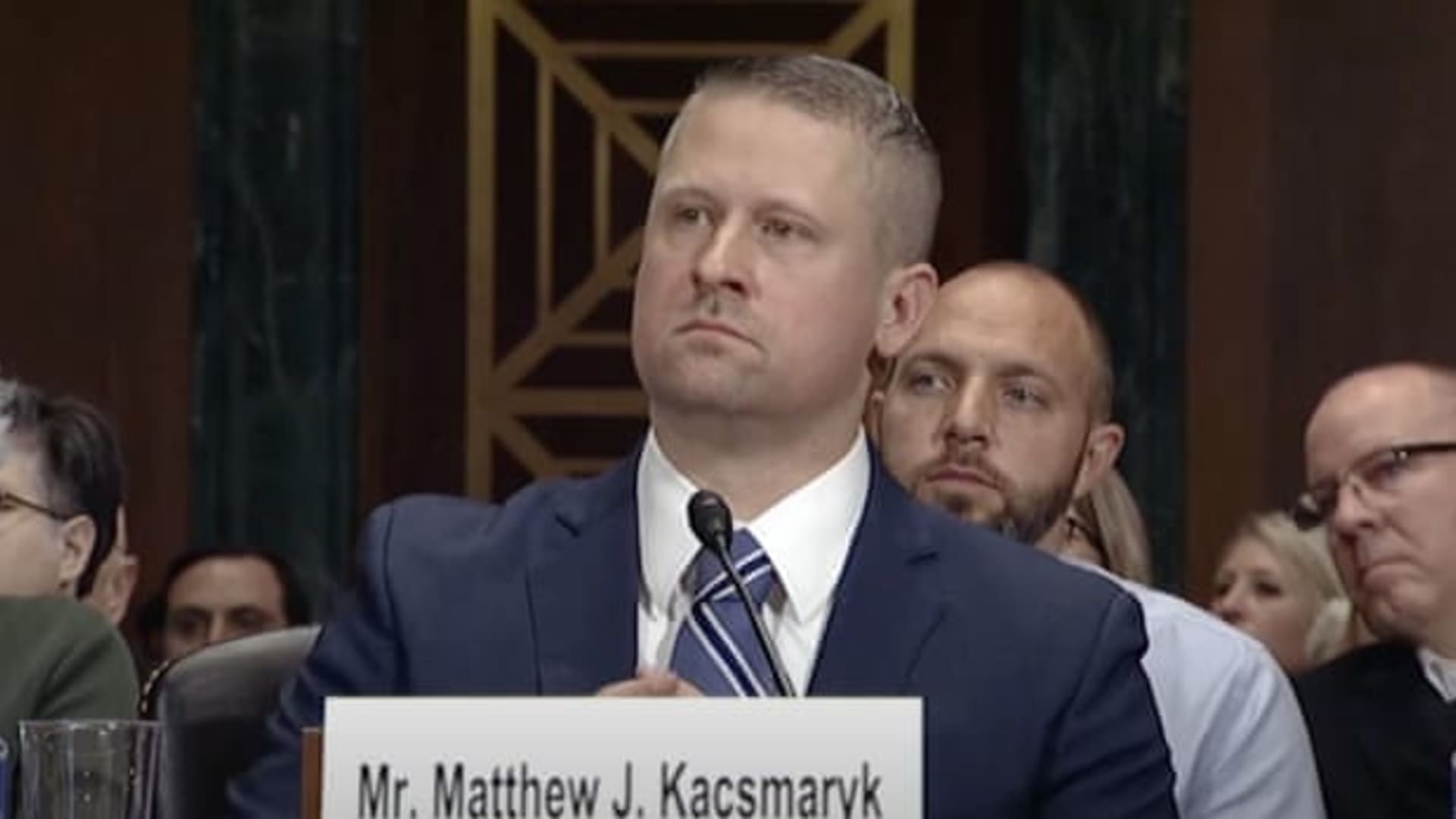U.S. judge in Texas will soon rule on the abortion pill mifepristone. Here's what could happen
The judge could order the FDA to withdraw mifepristone. He could also stop short of blocking sales and impose tougher restrictions on distribution instead.

The Alliance For Hippocratic Medicine wants Judge Kacsmaryk to nullify the FDA's medical approval of mifepristone, which would effectively ban the abortion pill across the US.
Senate Judiciary Committee | YouTube
A Texas judge will soon issue a pivotal ruling in a closely watched case challenging the Food and Drug Administration's approval of the abortion pill mifepristone.
The lawsuit filed by a group of doctors who oppose abortion, called the Alliance for Hippocratic Medicine, is an unprecedented case, and Judge Matthew Kacsmaryk of the U.S. Northern District of Texas could rule in a number of different ways.
He could order the FDA to pull mifepristone from the U.S. market entirely. It's also possible that Kacsmaryk could order the agency to impose tighter restrictions on access to mifepristone but stop short of completely halting sales. The judge could also rule in the FDA's favor, but the anti-abortion groups would appeal.
Kacsmaryk told the attorneys involved in the case during oral arguments in Amarillo on Wednesday that he will issue his decision "as soon as possible."
Abortion rights groups and legal experts expect the judge will rule against the FDA in some form. Kacsmaryk joined the court in 2019 after he was appointed by former President Donald Trump. His nomination was unanimously opposed by Senate Democrats as well Republican Susan Collins of Maine over concerns about his views on abortion and LGBTQ rights.
Wendy Davis, senior advisor at Planned Parenthood Texas Votes, told reporters at a news conference Wednesday that abortion rights activists are preparing for the worst.
A court order that blocks sales of mifepristone would have the greatest impact in states where abortion remains legal, said Carrie Flaxman, who heads litigation at the Planned Parenthood Federation of America.
Rachel Rebouche, an expert on reproductive health law at Temple University, said an order blocking sales would create confusion because there will be further litigation over whether such an order is legal.
Possible injunction
If Kacsmaryk issues an order to withdraw mifepristone from the market, there are several ways such a ruling could be drafted. The impact of his decision will depend on the language of the order and how the FDA chooses to respond.
"There are a lot of ways the court could effectuate a decision in our favor," said Erik Baptist, who is representing the Alliance for Hippocratic Medicine in the case and is the senior counsel at the Alliance Defending Freedom, another anti-abortion group.
Baptist told reporters during a news conference Thursday the judge could overturn the FDA's approval immediately or he could order the agency to initiate a process to pull mifepristone from the U.S. market.
Join CNBC's Healthy Returns on March 29th, where we'll convene a virtual gathering of CEOs, scientists, investors and innovators in the health care space to reflect on the progress made today to reinvent the future of medicine. Plus, we'll have an exclusive rundown of the best investment opportunities in biopharma, health-tech and managed care. Learn more and register today: http://bit.ly/3DUNbRo
"But how the court effectuates in terms of timing – does it go into effect immediately, does it go into effect in 30 days, again that's within the court's discretion," Baptist said.
Rebouche said it's possible the judge issues a ruling that orders the FDA to start the process of withdrawing mifepristone while at the same time suspending the drug from the market as the agency conducts that process.
Swift appeal
If Kacsmaryk issues an order to withdraw mifepristone immediately, the Biden administration would ask him to pause the decision pending its appeal, said Glenn Cohen, an expert on health law at Harvard. If Kacsmaryk refuses, the administration will take the case to the 5th U.S. Circuit Court of Appeals.
"My guess is stay papers are already drafted. Someone will put them before the court within hours of the decision," said Cohen, who previously served as a lawyer in the Justice Department's civil division.
Cohen, Rebouche and 17 other drug law experts, in a filing submitted to the court in support of the FDA, told Kacsmaryk that ordering an immediate withdrawal of mifepristone would conflict with federal law.
The authority to withdraw a drug resides with the FDA commissioner who makes that decision based on scientific evidence on the drug's safety and efficacy, they said. The manufacturer, in this case Danco Laboratories, is also supposed to get a hearing during the process.
"The FDA would argue the court cannot withdraw the drug — the FDA has to withdraw the drug and the court is preempted by federal statue from withdrawing the drug," said Rebouche.
FDA could drag out the process
If Kacsmaryk decides against an immediate withdraw of mifepristone and instead orders the FDA to initiate its formal process to pull the drug from the market, the agency can use the process to stonewall assuming he doesn't suspend the approval during that time,
"The withdrawal of a drug from the market when the FDA follows those procedures takes months if not years, so the FDA could try to draw out the process a little bit longer to keep the drug on the market in the meantime," said Allison Whelan, an expert on FDA law at Georgia State University.
"The FDA does not like its scientific expertise and legitimacy to be called into question," said Whelan, who also signed the filing to the court in support of the FDA.
Mifepristone off-label
The agency also has enforcement discretion under which it can choose to not go after companies that sell unapproved drugs, Whelan said. Mifepristone is also approved to treat a condition called Cushing's syndrome. Some clinics could decide to prescribe the pill off-label for abortions, she said.
And mifepristone is used in a two-drug regimen with another medication called misoprostol. Baptist with the Alliance Defending Freedom told reporters during the Thursday news conference that the lawsuit is only targeting the approval of mifepristone.
Misoprostol is recommended as a stand-alone method to terminate a pregnancy by the World Health Organization. Although the FDA has not approved misoprostol as an abortion medication on its own, clinics are planning on using the that pill as an alternative to mifepristone.
The American College of Obstetricians and Gynecologists recommends misoprostol as an alternative for early abortions if mifepristone is not available, though it's not as effective as the two-drug regimen, according to the organization.
Tougher restrictions
Kacsmaryk could also stop short of halting mifepristone sales and instead order the FDA to impose tougher restrictions on how the medication is distributed.
In January, the FDA permanently lifted a requirement that patients obtain mifepristone in person from a certified health-care provider. This allowed telehealth appointments and delivery of mifepristone by mail.
The Alliance for Hippocratic Medicine has asked the judge to reimpose FDA restrictions that have been rolled back over the years, arguing that a federal statue from 1873 called the Comstock Act bans sending abortion medication via mail.
Rebouche said the Comstock Act hasn't been enforced in decades, but there's a possibility that the judge could try to revive the statue to force the FDA to reimpose requirements that patients obtain mifepristone in person.
Correction: Allison Whelan is an expert on FDA law at Georgia State University. An earlier version misstated the name of the school.

 Tekef
Tekef 
































